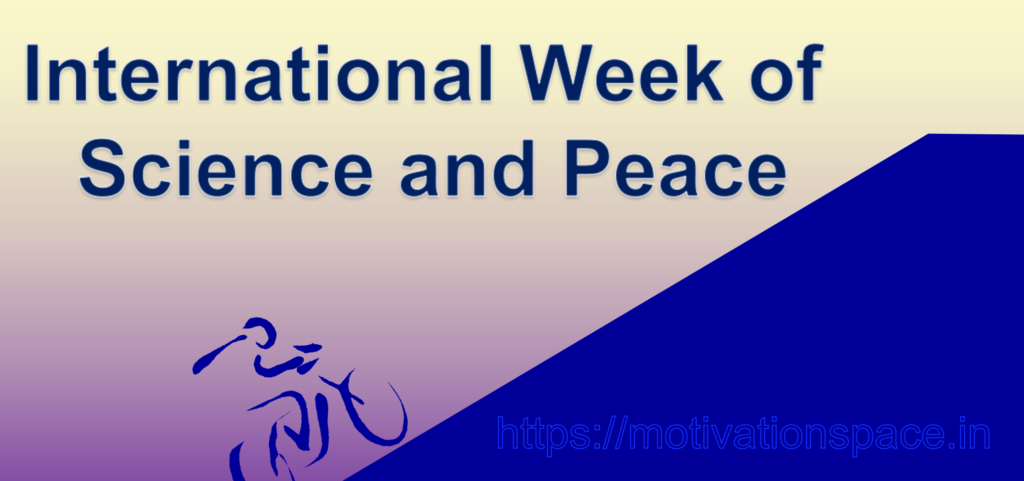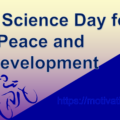Contents of this article
International Week of Science and Peace: Fostering Scientific Cooperation for Global Harmony. In a world frequently marked by division and conflict, the role of science in promoting peace and international collaboration cannot be overstated. The International Week of Science and Peace, observed annually from November 6th to November 12th, serves as a poignant reminder of the potential for science to transcend borders, bridge divides, and contribute to global harmony. In this article, we explore the history, significance, and initiatives associated with the International Week of Science and Peace.
The Roots of International Week of Science and Peace
The International Week of Science and Peace has its origins in the United Nations (UN) resolution A/RES/32/85, which was adopted by the General Assembly on December 8, 1977. This resolution emphasized the importance of scientific and technical progress in promoting international peace and security. It recognized that the advancement of science and technology, when harnessed for peaceful purposes, can have a profound impact on addressing global challenges, reducing tensions, and building trust among nations.
The first International Week of Science and Peace was observed in 1986, and it has since become an annual event, fostering collaboration, dialogue, and initiatives aimed at leveraging science for the greater good of humanity.
The Significance of Science and Peace
Science, with its inherent dedication to objectivity, evidence, and reason, has the potential to be a powerful force for peace. The significance of science and its contribution to peace can be understood in several key ways:
Diplomacy and Conflict Resolution:
Scientific cooperation can facilitate diplomatic efforts to resolve conflicts. Scientific dialogue can build trust among nations, leading to the resolution of disputes through peaceful means rather than confrontation.
Environmental Peace:
Many of the world’s most pressing challenges, such as climate change, resource scarcity, and pollution, require scientific solutions. International collaboration in the pursuit of environmental sustainability can reduce the risk of conflicts arising from competition over dwindling resources.
Disarmament:
Scientific research plays a pivotal role in arms control and disarmament. The verification of arms control agreements relies on scientific methodologies and technologies to ensure compliance.
Health and Well-being:
Science contributes to health and well-being, which, in turn, can foster peace. Access to clean water, healthcare, and nutrition, supported by scientific advancements, leads to healthier, more stable societies.
Economic Development:
Scientific and technological advancements drive economic development, reducing poverty and inequality. Prosperous and stable economies are less likely to experience conflict.
Education and Cultural Exchange:
Scientific cooperation often involves the exchange of knowledge and personnel, promoting cultural understanding and collaborative learning. This kind of cross-border interaction can bridge divides and build a foundation for peace.
International Week of Science and Peace Initiatives
During the International Week of Science and Peace, various initiatives and activities take place around the world, designed to harness the power of science in the pursuit of peace:
Conferences and Symposia:
Scientific conferences and symposia focus on themes related to peace, such as arms control, environmental sustainability, and health. These events provide platforms for researchers, policymakers, and practitioners to share knowledge and discuss collaborative efforts.
Educational Outreach:
Outreach programs target schools and universities, emphasizing the importance of scientific literacy and the role of science in promoting peace. These activities aim to inspire the next generation of scientists and peacemakers.
Research and Innovation Challenges:
Competitions and challenges encourage researchers and innovators to develop solutions to global challenges with a focus on peace and sustainability.
Cross-Border Collaborations:
Universities, research institutions, and organizations across borders collaborate on projects that address shared challenges and promote international cooperation.
Public Engagement:
Public lectures, exhibitions, and media campaigns aim to raise awareness about the contributions of science to peace and the role of citizens in supporting these efforts.
Policy Advocacy:
Scientific organizations and researchers often use the International Week of Science and Peace as an opportunity to advocate for policies that promote scientific collaboration, diplomacy, and arms control.
Success Stories: Science for Peace
Throughout history, there have been numerous instances where science and scientists have played pivotal roles in promoting peace and resolving conflicts. Here are a few notable examples:
Nuclear Disarmament:
The Pugwash Conferences, founded by Sir Joseph Rotblat, brought together scientists from the United States and the Soviet Union during the height of the Cold War. These meetings facilitated scientific dialogue and contributed to the eventual arms control agreements.
Climate Diplomacy:
The Paris Agreement, a landmark international treaty on climate change, resulted from scientific research and international cooperation. Scientists provided critical data and insights that informed the negotiations leading to the agreement.
Health and Pandemic Response:
The global response to the COVID-19 pandemic relied heavily on scientific collaboration. Researchers from around the world worked together to develop vaccines and treatments, demonstrating the potential of science to address global challenges.
Environmental Agreements:
Agreements such as the Montreal Protocol, which aimed to protect the ozone layer, and the Convention on Biological Diversity, illustrate how scientific research and collaboration can lead to international treaties that promote environmental sustainability and peace.
Challenges and Opportunities
While science has the potential to promote peace, it also faces challenges that need to be addressed:
Dual-Use Technology:
Scientific advancements can have both peaceful and harmful applications. Ensuring that the benefits of science are used for the greater good is a persistent challenge.
Ethical Considerations:
Ethical dilemmas, such as those related to research in areas like artificial intelligence and biotechnology, require careful consideration and international dialogue.
Access to Scientific Knowledge:
Disparities in access to scientific knowledge and resources can hinder international collaboration. Ensuring that all nations have equal access to scientific advancements is essential.
Nationalism and Scientific Collaboration:
Rising nationalism and geopolitical tensions can hinder scientific collaboration. Overcoming these challenges requires diplomatic efforts to maintain open scientific communication.
Conclusion for The International Week of Science and Peace
The International Week of Science and Peace stands as a testament to the potential of science to bridge divides, foster collaboration, and promote international peace. As the world faces complex global challenges, from climate change and pandemics to nuclear proliferation and conflict, the role of science in addressing these issues has never been more critical. By recognizing the importance of this annual observance, we can renew our commitment to harnessing the power of science for the betterment of humanity and the advancement of global harmony. Science, when employed for the common good, can be a powerful force for building a more peaceful and equitable world. You may drop a comment below or contact us for any information related to this website’s content.


